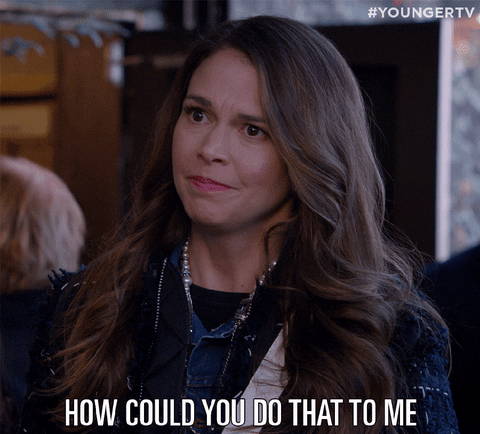
I don't think there is one person reading this who hasn't been betrayed by a friend before. I will also go so far as to say that there are very few situations that can be as painful—and sometimes also as blindsiding—as this kind of experience either. But as you get older—and hopefully wiser—you come to accept that no one is perfect, folks mess up and not everything should come with an immediate "Bye. I'm done."
Some friendships are far too valuable to be that…immediately reactionary.
So, how can you know what to do when you find yourself in a set of circumstances where you're hurt, maybe even mad as hell, and you really don't have a clue what you should do? I'm hoping that this article can help to provide you with some of the clarity that you seek, sis. Ask yourself these six questions and see if the answers can't point you into the direction of what you need to do—next.
Betrayal Has Layers. What Kind Was It?

If you spend enough time on this planet and you make it a personal point to actually learn as you go, something that life will teach you is most things have layers to them; betrayal is certainly no exception. And, if you're someone who accepts that you are human and flawed, just as much as the next guy or gal, you'll also humble yourself enough to admit that you've probably betrayed someone before too; maybe even the person who just betrayed you.
Why do I say that? Because betrayal has several different definitions:
- to deliver or expose to an enemy by treachery or disloyalty
- to be unfaithful in guarding, maintaining, or fulfilling
- to disappoint the hopes or expectations of
- to reveal or disclose in violation of confidence
- to reveal unconsciously (something one would preferably conceal)
Back when I wrote the article about why I prefer my friends to not be friends with each other, some of y'all went on and on about how insecure that kind of boundary is. First, it's always a good idea to read more than the title of something; the entire piece oftentimes offers up a broader perspective. Second, I'll tell you this—having that boundary has eliminated A LOT of the betrayals that I used to experience before I had put the boundary in place (especially when it comes to things like disclosing a violation in confidence, even if it was unconsciously). Sometimes, a betrayal isn't calculated or intentional. Sometimes, folks just mess up.
So yeah, before deciding if you should immediately cut someone out of your life (by the way, check out "Why I Don't 'Cut People Off' Anymore, I Release Them Instead"), think about the level of betrayal it was. Did your friend do something that was calculated and/or malicious? Or was it simply a mistake? It's important to really take this step into account because, when emotions are running high, we can oftentimes make a rash decision without taking everything into account before we do so—including processing the facts, not just how we feel at the time.
This brings me to the next important point.
What's Their Previous Track Record Been Like?

I remember when one of my closest friends betrayed my confidence. Whew. One of their friends was going through something and so my friend shared one of my deepest secrets, hoping that it would give their friend some perspective. Problem was, even though they didn't say my name, my friend gave enough "clues" that their friend was able to figure it out and ended up talking about it on some podcast, believing that it would help others as well. All of this happened without my permission. I. Was. Pissed. Still, while some people might see this as an automatic deal-breaker, I didn't. I didn't because the friend who did this to me had been a really good friend before this major snafu. They were committed. They were supportive. They were loyal. They were honest. They are just human and they messed up. Big time. But not big enough for me to, as grandma used to say, "Throw the baby out with the bathwater."
Betrayal hurts, no matter what "layer" or form that it comes in. But when you've got a good friend in your life, getting rid of them because of one mistake can end up hurting you a lot more than forgiving them and moving on. Try your best to not only think about the one way that they royally f'ed up. Factor that in, along with the kind of friend that they've been to you since they've become a part of your life.
Are They Truly Remorseful?

A while back, I wrote an article for the site entitled, "Why Regret Might Not Always Be A Bad Thing". If you don't have time to check it out right now, the gist is that, I'm not big on people who don't believe in having regrets in life. Regret means remorse and we all do things from time to time that result in us (hopefully) regretting wrongdoing (unless you're something along the lines of being a raging narcissist or something). In fact, regret is oftentimes what we need to feel in order to make some real and lasting changes in our lives.
Same thing goes for a friend who betrays you. If when you confront them about what happened, they are on some, "I don't regret anything in life" or the phrase that irritates me like no other, "It is what it is", that doesn't sound like someone who feels badly about what they did to you. And if they don't really care, there is a huge chance that they could do it again (or that they've been doing some shady stuff that you just haven't found out about…yet).
So, how can you know if someone is truly remorseful? It's hard to give an across-the-board answer because people express remorse in different ways. But if they happen to bring the betrayal to you before you find out another way, if they apologize without offering up a lot of excuses or justifications and/or they ask you how they can make it up to you—those are some indicators that they probably get the magnitude of what they did; that you should at least consider hearing them out and giving the friendship another shot.
Do You Absolutely Suck at Forgiving?

People who aren't good at forgiving others either don't have many friends or they are constantly getting into and out of friendships. That's not a random happenstance either. It's usually because they want to receive the kind of grace and mercy that they absolutely have no intention of extending to others. I know this because I used to be a lot like that. Because I grew up surrounded by people who basically weaponized forgiveness (in my family, at my church, in my so-called friendships and in my private Christian schools), I saw it as a manipulative tool rather than a peace offering. So, I used to think that forgiving someone meant I was giving them carte blanche to keep hurting me over and over…and over again. So, I struggled with fully doing it.
It took getting some space from people who abused forgiveness in my world to understand that 1) from a spiritual standpoint, forgiveness makes things right between me and God (Matthew 6:14-15); 2) forgiving someone doesn't automatically mean that things go back to the way they were. The person in need of the forgiveness needs to be remorseful, be open to things taking time to heal, and we both need to assess if we should be the same kind of friends again, and 3) if I don't forgive, it's just gonna make me bitter; bitterness ultimately stagnates my growth and typically infects the other relationships around me too.
I know a lot of people think that some things don't deserve forgiveness. I disagree. If you want to keep life's situations from harming your mind, body and spirit, forgive it all. Just don't think that means you have to still engage the person, place, thing or idea that you needed to forgive. Anyway, whether you agree with me or not on this, if you're contemplating not forgiving your friend because, in your mind, they don't "deserve" it, ask yourself if this is how you feel every time someone disappoints you. If the answer is "yes", I'd venture to say that the internal struggle you're having has less to do with the betrayal and more to do with you needing to learn how to forgive better. And more. For your own sake.
What Are the Pros and Cons of the Friendship?

Here's something else that you might want to ponder, just a bit. Chances are, if this is the first time that your friend betrayed you and it wasn't something huge like stealing your money or sleeping with your man, you wouldn't be contemplating ending the relationship unless things have been on the verge of destruction for a while now anyway. That's why, if you're not 100 percent sure what you should do, it can also be helpful to take out a piece of paper and jot down the pros and cons of the relationship overall. While there are certain hacks that can help you to make split-second decisions (check out "Need To Make A Big Decision Quickly? Do This."), deciding whether or not to end a friendship deserves some real pondering. The benefit of coming up with a pros and cons list is it can help you to process your situation from a logical and obsessive point of view. For instance, if the pros far outweigh the cons, it's probably worth working through the betrayal rather than ending things altogether. On the other hand, if the cons outweigh the pros then…maybe this latest "shake up" is nothing more than the straw that has broken the camel's back. A list can help you come to this kind of conclusion.
Can You Let the Ish Go?

This last point? In all actuality, it has very little to do with your friend and what they did, and all to do with you and if you can truly heal and move on from it. I know from very personal experience (both on the giving and receiving end of forgiveness) that you haven't truly forgiven someone if you're constantly going to bring up what they did or if you're going to try and use their offense against them in order to "trump" some of your own BS in the future. Some foundational truths about a healthy friendship is both people are able to accept one another's humanness, forgive each other's faults and then move forward—together. If this betrayal runs so deep that you know you can't do this, don't waste each other's time or further cause harm by trying to stick it out, knowing that you can't let it go—if not immediately, eventually. If the betrayal is going to keep you both stagnant, discuss, forgive and then bring things to an end with the hopes and prayers that you both learned from this betrayal—so that you know how to handle things…differently with others. In the future.
Join our xoTribe, an exclusive community dedicated to YOU and your stories and all things xoNecole. Be a part of a growing community of women from all over the world who come together to uplift, inspire, and inform each other on all things related to the glow up.
Featured image by Giphy
- Why You Shouldn't Subscribe To The "No New Friends" Mantra ... ›
- Why Talking About Your Friends Behind Their Back Is Normal ... ›
This Is How To Keep 'Holiday Season Stress' From Infecting Your Relationship
Hmph. Maybe it’s just me, but it seems like there is something really weird happening in the fall season air (because winter doesn’t officially begin until December 21) that cuddle season is in full swing while break-up season is as well. In fact, did you know that break-ups are so popular during the holiday season that December 11 is deemed Break-Up Day?
The reasons why relationships shift around this time vary; however, I did both roll my eyes and chuckle when I read that a very popular one is because it’s an easy way to get out of getting one’s significant other a Christmas present. SMDH.
Anyway, I personally think that the less shallow folks out here may contemplate calling things “quits” or they at least distance themselves a bit from their partner (and what I’m referring to is serious relationships) due to all of the stress and strain that oftentimes comes with the holidays whether it be financial, familial, due to their tight schedules or something else.
Listen, I would hate for you and your man to miss the fun and happiness of experiencing this time of year, all because you are so overwhelmed or irritated that you can’t really enjoy it. That’s why I have a few practical tips for how to avoid allowing the typical holiday season stress from INFECTING your relationship.
Manage Your Expectations
 Giphy
GiphyUnmanaged expectations. If there is a main reason why the holiday season tends to be so stress-filled for so many people, I’d bet good money that this is the cause. And when you’re in a long-term relationship, expectations can manifest themselves in all sorts of cryptic and/or unexpected ways. You might have relatives who assume that you are going to be with them for Thanksgiving or Christmas when you have other plans in mind. You might be thinking that you are going to spend one amount for presents while your man is thinking something totally different. When it comes to scheduling, your signals may be crossed.
And you know what? To all of these scenarios, this is where clear and consistent communication come in. Don’t assume anything. Don’t dictate anything either. From now until New Year’s, mutually decide to check in once a week, just to make sure that you are both on the same page as it relates to the holidays and what you both are thinking will come along with it. The less blindsided you both feel, the less stressed out you will be. Trust me on this.
Set (and Keep) a Budget
 Giphy
GiphyOkay, so I read that last year, 36 percent of Americans incurred some type of holiday-related debt. Hmph. Last year, there was still some sense of normalcy in this country, chile, so I can only imagine what finances are gonna look like over the next several weeks. That said, since I don’t know a lot of people who don’t find being broke stressful, make sure that you and your bae set a budget and then stick to it this year — no ifs, ands or buts.
Because really, y’all — it doesn’t make sense to deplete savings and/or max out credit cards for a few days of giggles only to be damn near losing your mind because you don’t know how to make ends meet come Dr. Martin Luther King, Jr. Day.
And by the way, this tip doesn’t just speak to things like food and gifts; I also mean travel. If it doesn’t make a ton of sense (or cents) to be all over the place this year — DON’T BE.
Keep Matthew 5:37 at the Forefront
 Giphy
GiphyIf off the top of your head, you don’t know what Matthew 5:37 says, no worries, here ya go: “But let your ‘Yes’ be ‘Yes,’ and your ‘No,’ ‘No.’ For whatever is more than these is from the evil one.” That verse right there? Oh, it’s a boundaries lifesaver! I say that because do you see “maybe” or “I’ll think about it” in there? Nope. LOL. It says that you should tell people “yes” or “no” and leave it at that — and that complements Anne Lamott’s quote, “’No’ is a complete sentence” impeccably well. Yeah, you’ve got to remember that anything beyond a yes or no to a request is privileged information; you don’t owe anyone details or an explanation.
Besides, if you are really honest with yourself, when someone asks you something and you give a “Umm, let me think about it” kind of reply, more times than not, you already know what your answer is going to be — so why not let you both off of the hook? Give your response. Commit to that. And let everyone (including yourself) get on with their lives and schedules.
I promise you that when it comes to those holiday parties, you are pissing more folks off by not RSVP’ing or doing so and not showing up than just saying, “Thank you but not this year” off the rip.
Remember That Your Personal Space Is Privilege Not a Right
 Giphy
GiphyA friend of mine recently bought a new house and invited me over to come see it. He’s a single man with no children, so as I was taking in all of the space that he had, especially as I walked through his finished basement, I joked about relatives coming to live with him. “Hell no” and “absolutely not” were pretty much his immediate responses as he went on to say that some folks even had the nerve to be offended when he told them that he had no intentions on taking DNA in.
Ain’t it wild how people think that your stuff is their right? And yes, that brings me to my next point. Your home is your sanctuary space. If you want to host folks this year — cool. If not, ALSO COOL. Please don’t let folks (family included) guilt you into how they want you to act or even into what they would do if the shoe was on the other foot. You are not them — and as one of my favorite quotes states, “If two people were exactly alike, one of them would be unnecessary.” (A man by the name Larry Dixon said that.)
Hell, my friends? They know that I am good for sending them random things that they need or even want all throughout the year. Coming over to hang out at my pace, though. Uh-uh. Chalk it up to being a card-carrying member of the ambivert club yet I like keeping my living space personal — and I sleep like a baby, each and every night, for feeling that way.
Always remember that your space, your time, your resources, your energy and shoot, yourself period (including your relationship), are all things that are your own. You get to choose how, when and why you want to share them. The holiday season is certainly no exception.
Cultivate Some “You Two Only” Traditions
 Giphy
GiphyIt’s not uncommon for some couples to hit me up after the holiday season to “detox.” Sometimes it’s due to the financial drama (and sometimes trauma) that they experienced. Sometimes it’s because they allowed their relatives (especially in-laws) to get more into their personal business than they should’ve. More than anything, though, it tends to be because they didn’t get enough quality time together and so ended up feeling “disconnected.”
Please don’t let that happen. Listen, I’m not even a holidays kind of woman and yet, I will absolutely sit myself down with some hot chocolate and chocolate chip cookies to enjoy a Hallmark holiday film or two. Aside from the fact that most of them are lighthearted and sweet, I also like that they usually focus on couples loving on each other amidst all of the holiday beauty and ambiance — which is something that all couples should set aside some time to do.
Maybe it’s a vacation. Maybe it’s a staycation. Or maybe it’s my personal favorite, A SEXCATION. Whether it’s for a few days, the weekend or even overnight — don’t you let the holidays go by without setting aside time for you and your man to celebrate one another. Don’t you dare (check out “Are You Ready To Have Some Very Merry 'Christmas Sex'?”).
GET. SOME. REST.
 Giphy
GiphyI once read that 8 out of 10 people get stressed out over the holidays and 3 out of 10 lose sleep during to it — and when you’re stress-filled and sleep-deprived, that can absolutely lead to hypersensitivity, making mountains out of molehills and even not being in the mood for sex.
Your relationship can’t afford to go through any of this, so definitely make sure to prioritize rest. I don’t care how unrealistic it might seem during this time, sleep should never be seen as a luxury; it will always and forever be a great necessity.
That said, try to get no less than six hours of shut-eye in (check out “6 Fascinating Ways Sex And Sleep Definitely Go Hand In Hand”) and even ask your bae to take a nap with you sometimes (check out “Wanna Have Some Next-Level Sex? Take A Nap, Sis.”). Not only will sleep help to restore your mind, body and spirit but, when it’s with your partner, it’s an act of intimacy that can make you both feel super connected, even in the midst of what might feel like chaos.
___
Holiday season stress is real. Still, never give it the permission or power to throw your relationship off. Put you and your man first and let the holidays be what they are gonna be, chile.
Let’s make things inbox official! Sign up for the xoNecole newsletter for love, wellness, career, and exclusive content delivered straight to your inbox.
Featured image by Shutterstock
Whew. Did you know that somewhere around 122 million Americans travel during the holiday season? Listen, I went to see my godbabies this past September and got caught up in a crazy ass traffic jam at BNA (the Nashville airport) that damn near has me considering air travel ever again — especially during this time of the year.
Besides, it’s not like it’s a written rule that you have to travel over the holidays. In fact, if you want to play it chill this year, why not enjoy a staycation instead? Although it might seem like it’s a “poor man’s compromise,” as you’re about to see, it actually…isn’t.
1. Go All Out with the Christmas Décor
 Giphy
GiphyThere is someone I know who is so obsessed with Christmas, she’s damn near annoying-borderline-terrifying. I’m. Not. Kidding. Yet hey, if you’re going to do a holiday-themed staycation (emphasis on “holiday-themed”), that’s kind of how you’ve got to be. Some décor ideas include:
- A fresh Christmas tree (is the most ideal) that is ultimately decorated
- Wreaths on outside and inside doors
- Garland (with twinkle lights) in predictable and unpredictable places
- Poinsettias
- Mistletoes
- Snow globes
- A stocking (with some of your favorite things in it)
- Fake snow
- Stars
- Angels
- Candy canes
- A BLACK Santa (LOL)
I mean, since you are going to be spending a lot of time at home, it can feel like a mini-winter wonderland if you are intentional about doing more decorating to your living space than you ever have before!
2. Buy a Couple of Christmas-Themed PJs
 Giphy
GiphyWhile I was doing some research on a totally different topic, I happened upon an article that talked about the psychology behind why we should be intentional about what we wear to bed. When you stop to think about the fact that (hopefully) you are sleeping somewhere between 6-8 hours every night, it would make sense that things like the color and fabric of your sleepwear would have a real impact on you — even subconsciously.
Well, when it comes to Christmas décor, specifically, not only does it take you back to nostalgic memories, it can also boost your moods. So, aside from being on-10 with your Christmas décor, also invest in some Christmas-themed PJs. Since you’re going to be doing a lot of lounging around (RIGHT?), do it in something that makes you think about all of your favorite things about this time of year.
3. Cop Some Christmas-Scented Candles
 Giphy
GiphyThere really is no telling how many articles that I’ve written where I am singing the praises of scented soy candles. Candles are soothing, comforting and a very easy way to reduce stress. Also, since it gets darker quicker and for a longer period of time around this time of the year, candles provide a relaxing vibe to your home. Since it is Christmastime, go with scents that are reminiscent of the season:
- Cinnamon
- Vanilla
- Cranberry
- Apple
- Pine
- Frankincense and Myrrh
- Peppermint
- Cashmere
- Ginger(bread)
- Orange
- Sugar Cookies
- Sandalwood
- Cloves
- Cedarwood
- (Hot) Chocolate
Personally, one of my favorite candle companies is Goose Creek. Their signature collections will have your entire house smelling like a high-end bakery. No exaggeration.
4. Play Some Winter-Themed ASMR Sounds
 Giphy
GiphyI’m from Nebraska and my mother was a New Yorker. So, if there is one thing that I like, it’s seasons and that includes snow during wintertime. Unfortunately, Nashville is cray-cray when it comes to that. If, where you live, the weather is all over the place too (which is why I think it’s insane that some people still give pushback to global warming) and you would like for it to at least seem like you are in your own winter wonderland — invest in some fake snow to strategically place around your home.
Oh, and don’t forget to turn on some winter-themed ASMR sounds too. YouTube has videos that run for hours on end that feature blizzards and howling winds that really can make you feel like you are in the midst of an ice storm.
5. Host a Holiday Movie Marathon
 Giphy
GiphyOne thing to remember about a staycation is it doesn’t mean that you have to be alone or that the only people who can participate are the ones who live with you. Since a staycation is simply about staying close to home instead of traveling afar — absolutely consider having some of your favorite people over for a holiday-themed movie marathon. Shoot, Black America Web even did you a solid by publishing “25 Best Black Christmas Movies Of All Time;” plus, Tubi has a Black holiday hits section of indie films too.
Oh, and make sure to get creative with the Christmas-themed snacks. Some ideas? Some Kentucky-fried turkey tenders with cranberry hot sauce (recipe here), some Holiday Hot Spinach Dip (recipe here), some Grinch Kabobs (recipe here), some roasted pecans (recipe here) and some Pomegranate Guacamole (recipe here).
6. Spend a Night (or Two) at a Hotel or Vacation House
 Giphy
GiphyJust like you don’t have to be alone during a staycation, you also don’t have to be cooped up in your house the entire time. Get a change of scenery in your own city by spending the night in a hotel that you’ve always wanted to try out or renting a vacation house for you and some of your folks to hang out in during the time between Christmas and New Year’s Day. I have a “love little sister” who does this randomly when she needs a break from her work as a therapist. She says that it’s damn near like taking a trip (and she has PLENTY of passport stamps; trust me).
7. Have Brunch or Dinner at a Christmas-Themed Restaurant
 Giphy
GiphyIf nothing puts a bigger smile on your face than the thought of DoorDashing meals and barely even touching your stove during your staycation — hey, I am right there with you. Do consider going out to brunch or dinner during your chill time, though. It’s another way to bond with people and create some current holiday memories. And if you’ve got a bae and you opt for dinner, it can be a wonderful type of Christmas-themed date.
8. Go to a Holiday-Themed Concert
 Giphy
GiphyBeing that I got my start as an entertainment writer, hear me when I say that I’m not someone who just has to go to a live concert every chance that I get. Oh, but baby, when I saw that El DeBarge was doing a City Winery tour and he was going to be here right before Christmas — I booked myself a ticket quick, fast and in a super-duper hurry! Shoot, I didn’t even want to go with someone because I plan to give him and that falsetto voice of his my complete and undivided attention. LOL.
I don’t know what it is about the holiday season that makes live music that much more enjoyable — but if there is a concert that features one of your favorite artists happening right through here, consider that to be a cool way to “tour your city” while cultivating a really awesome memory at the same time.
9. Also, Go Ice Skating
 Giphy
GiphyOne of my fondest memories of time with my father is going ice skating. We actually would do it in the summer (because that is when I would visit him) and, every year, he would get me a new ice skating outfit. Even now, when I watch someone ice skate (even in movies; like in the classic movie Garden State), I will have warm fuzzies.
Anyway, if you’ve never been before, go. If it’s been forever since you have, also go. There is something that is very sweet and so signature Christmas about it. Plus, it’s a top-tier form of exercise.
10. Take a Christmas Lights Tour
 Giphy
GiphyAnother one of my favorite Christmas memories is driving through neighborhoods and looking at the Christmas lights. And just like a Christmas concert can be a form of hometown touring, so can doing this if you decide to choose a couple of areas where you’ve never really been or rarely frequent.
Now are you excited about the thought of experiencing a holiday-themed staycation?
I thought you would be. ENJOY!
Featured image by Shutterstock









